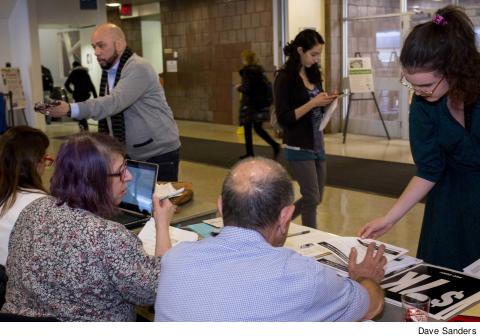The new reality for unions
 |
When the Supreme Court ruled in June 2018 in Janus v. AFSCME that unions like the PSC could no longer collect agency shop fees from non-members, the union faced a new reality: throughout the year, organizers and campus leaders would need to reach out to newly hired faculty and staff and ask them to sign union cards.
It’s common for campuses to hire throughout the year, especially in staff positions, but the beginning of a semester is the busiest time when the union is setting up orientations and reaching newly hired faculty and staff.
BIG DAY AT GC
Union organizers and activists are happy to report that enthusiasm at the beginning of the Fall 2019 semester is high. The Graduate Center chapter, for example, reported that it had signed up nearly 150 new members in August.
This good news is the result of organizing that began before the Supreme Court handed down its ruling. In anticipation of the ruling, the PSC created teams of member-organizers who are tracking down non-members on their campuses to have one-on-one conversations about joining the PSC. In a presentation to the union’s Delegate Assembly meeting, First Vice President Andrea Vásquez noted that the union has signed up more than 800 new full-time members in the last year. “That’s a huge accomplishment,” Vásquez said.
But the work is constant: for example, at York College, before the court decision was handed down the chapter reached a 100 percent full-time membership rate, then dropped down to 98 percent this academic year, but after chapter organizers reached out to the non-members, York College reached 100 percent membership again among full-timers. However, the membership rate across CUNY has declined among part-timers from 63 percent to 60 percent, even though the number of unionized part-timers has gone up in the last year from 9,672 to 9,798, because the total number of adjuncts has increased dramatically. The union will need to have a more aggressive union outreach campaign among the part-timers, especially new hires.
Clarion contacted some of the new members who signed union cards at the beginning of this semester. As always, newly hired faculty and staff can join the union by contacting their chapter chair or going online.
Caring for all
I didn’t hesitate to sign up. I love unions. Everyone I know who is in a workplace that has a union is better able to bargain their wages or bargain time off. Everyone I know who isn’t in a union, they just get abused by their employer because there is no one to turn to.
To me, being part of a union means caring about everyone – everyone who works with you and everyone who works in the same organization as you – and making sure that we all have the same rights. It’s about speaking up for other people. If they don’t know that their rights are being trampled on, they won’t say anything. But if we are all in the union, we can all go to a meeting to know our rights.
Now is a very important time for new members to get involved, during contract negotiations and the $7K for adjuncts campaign. It’s important to keep up the pressure. New students have to get just as involved as fourth, fifth, sixth and seventh-year students to tell the Graduate Center that it’s not just a fluke that a lot of people join the union one year. It’s a culture of being collective and making sure that all of us are taken care of.
Inayah Entzminger
Graduate Assistant, Biochemistry
Graduate Center
Union family
I started working at Hostos at the end of July, and I signed up for the PSC in August. I’m a very fast-paced person. I don’t like to kill any time.
I have nothing to worry about in terms of walking a straight line, but there could come a time when part of the job doesn’t go right for you. I feel like being in the union is a good protection. It can be on your side.
I’m a traditionalist. I have family members who were and are in the union. My father was in the union. He was a butcher. My brother-in-law is an electrician and is a part of Local 3 [of the IBEW].
My father got hurt on the job, years back. He was forced to retire. Being a union member helped him in terms of retirement. He worked hard, has a nice life, and he got a good pension. I believe it’s because he was part of the union. I hope for the same kind of future for myself.
Nicholas Valente
Financial Aid Specialist, ASAP
Hostos Community College
Red for higher ed
At all the previous colleges where I worked, there wasn’t a union. The administration could decide whatever it wanted about faculty’s working conditions, and the faculty themselves didn’t have a say. Class sizes would go up constantly with little discussion. Salary increases could be frozen with no explanation.
At Queens College, no decision about pay, teaching evaluation and benefits can be taken without taking into account the union’s perspective.
The current attack on organized labor across the US is a clear response to increased worker militancy in the last several years. Teachers’ strikes are making headlines. Workers are rediscovering their power in these struggles. That scares the bosses. It’s important for me to be a union member and participate in this struggle.

